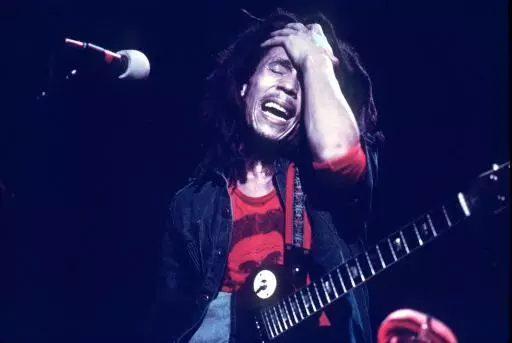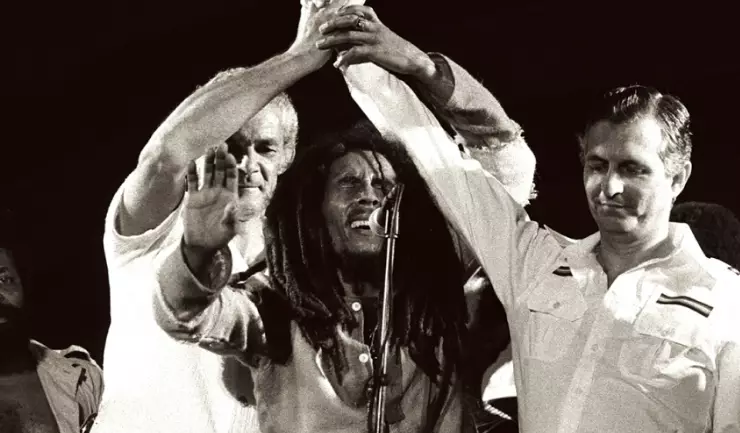
Today marks the 35th anniversary of Bob Marley's death - a singer who managed to unite people in Jamaica and all over the world with his music.
Robert Nesta 'Bob' Marley used his success to make the richest nations take note of the plight of the third world as well as spreading a message of justice and peace during a time of serious political unrest in Jamaica.
Under the leadership of Michael Manley, there was unprecedented violence on the streets of Kingston. On one side were the supporters of Manley's People's National Party and on the other were supporters of their rivals, the Jamaica Labour Party, which was led by Edward Seaga.
Advert
Just two days before Marley was set to play Smile Jamaica, a concert organised by the Prime Minister to reduce tensions between the political factions at war, Marley was shot at by an unknown gunman.
Thankfully, the singer only suffered from minor wounds in the arm and chest.
Despite being injured from the attempted assassination, he still went on to play the concert.
"The people who are trying to make this world worse aren't taking a day off. How can I?" he said.
Advert
Bob Marley's best quotes
Marley played through the injuries and spread his message to the festival crowd of 80,000.
He left Jamaica for England shortly after the festival, but he'd be back soon enough. His work was not done.
Jamaican politicians were known to hire gangsters and arm their gangs to help take control of urban constituencies. But when rival gang leaders Claude Massop (JLP) and Bucky Marshall (PNP) found themselves locked up in the same cell, they decided enough was enough.
Advert
The rival gangsters now called themselves a peace committee, but they'd need help if they were to even try to stop the fierce gun battles taking place in Kingston's ghettos between their own street gangs.
Massop flew out to the UK to persuade Marley to return home and help bring peace to war-torn Jamaica. He accepted, despite the obvious risks.
On April 22 1978 at The National Stadium in Kingston, the One Love Peace Concert, or 'Third World Woodstock' as it was known, took place in front of 32,000 spectators.
The violence was so out-of-control in Kingston at the time that there was a ban on the sale of oranges at the festival. Authorities feared they'd be used as weapons.
Advert
During the concert, under a full moon, Marley improvised while performing his song Jammin' and spontaneously summoned the Prime Minister, Manley, and the opposing leader, Seaga, to join him on stage.
"I'm not so good at talking but I hope you understand what I'm trying to say.
"Well, I'm trying to say, could we have, could we have, up here onstage here the presence of Mr. Michael Manley and Mr. Edward Seaga. I just want to shake hands and show the people that we're gonna make it right, we're gonna unite, we're gonna make it right, we've got to unite.
"The moon is right over my head, and I give my love instead. The moon was right above my head, and I give my love instead," Marley said.
Advert
Marley stood on stage between the two surprised leaders. With his hands on their shoulders, he pulled them together and through plumes of marijuana smoke, they could be seen shaking hands for the first time.
For a brief moment, there was hope for the people of Kingston.
The crowd went wild. Gunmen, opposing political parties and Rastas all rejoiced together.

There was only one man in the world with the power to bring these two fierce rivals together, hand in hand, and that was Bob Marley.
As iconic as that moment was, and though it sent a clear message that peace was achievable, it didn't bring and end to the violence and bloodshed. It had gone too far. The hatred between the opposing sides was too deep-rooted to just stop overnight.
Both of gang leaders, who had pleaded for Marley's help in bringing an end to the civil war, were killed within a couple of years of the concert.
The United Nations' Peace Medal of the Third World was given to Bob Marley for helping to fight for justice and peace in third world countries.
While Marley's music may not have directly stopped this brutal war, it gave hope to millions, not only in his home country, but all over the world.
He passed away in 1981 and received a state funeral in Jamaica.
Both Manley and Seaga were reunited at the funeral. They shook hands once more in memory of the man who fought so tirelessly to bring peace to his homeland.
Words by Liam Bond